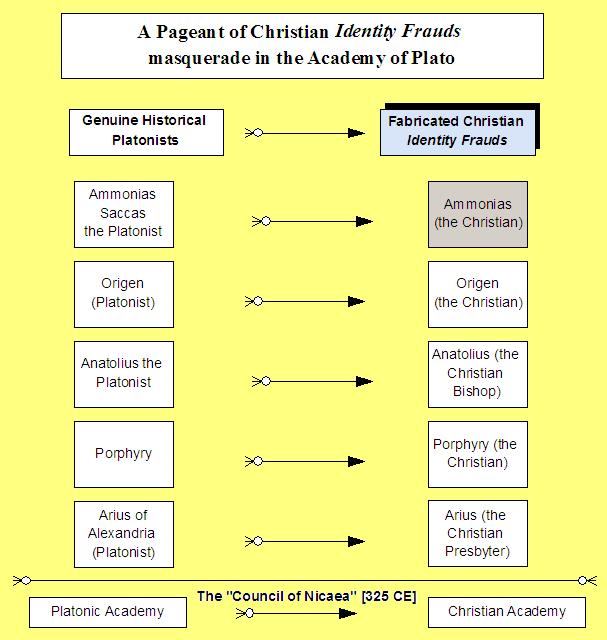DCHindley wrote:theo,
I just see this as 4th century Christians wanting to associate generally famous persons with themselves if only on the basis that they shared a name with a Christian author.
I think it is more than that - the 4th century Christians wanted to associate themselves with a lineage of philosophers. The lineage was apostolic and the lineage had preserved a "canon of books" from an original author (Plato) for many centuries.
I think that despite Eusebius' belief to the contrary, Origen the Christian teacher of Alexandria (later Caesarea) was not the same as the famous Platonist philosopher Origen, also of Alexandria.
Eusebius' "belief" or "assertion" or "fabrication"?
While I am less familiar with Ammonius, but I can see Christians like Eusebius noting that a famous philosopher held a philosophical doctrine that resonated with Christian "philosophy," and reasoning that he could "only" have held such a position because of Christian philosophical presuppositions.
There is another simpler alternative. That is Eusebius simply lied about the 3rd century lineage of Christians by borrowing a few well renown 3rd century Platonist names.
To these two a third name can easily be added, namely Anatolius of Alexandria. Eusebius presents an Anatolius the Christian Bishop of Anatolia.
However this is what Rowan Williams has to say about this character .... In a revised edition 2002 of ARIUS: Heresy & Tradition, Rowan Williams revises his previous opinions on Anatolius, with the summary: "
The suggestion that Anatolius, Iamblichus' teacher, is to identified with the Christian Bishop Anatolius of Laodicaea ... is a conjecture regarded very skeptically indeed by several well qualified judges." p.262
I have written an essay about this series of extremely surprising coincidences here:
http://www.mountainman.com.au/essenes/N ... Christ.htm
It is entitled "A Pageant of Christian Identity Frauds masquerade in the Academy of Plato"
ABSTRACT wrote:
Evidence is presented to substantiate the presence of at least a trinity of Christian Identity Frauds masquerading in the Academy of Plato during the 3rd century. (1,2,3) From the 4th century mention is resurrected of Porphyry's Christian Identity Fraud and the likelihood is explored that the Christian Presbyter Arius of Alexandria, is just another Identity Fraud in a pattern of similar evidence. (4,5) The events of the Council of Nicaea are reconstructed in such a manner as to narrate from the profane perspective, the heresy, the exile and the "damnatio memoriae" of Arius of Alexandria, a non christian theologian/philosopher associated with the Alexandrian academy of Plato c.324 CE. (6,7)
•(0) Introduction - The Nondual God of Plato, Plato's Canon and its Apostolic Lineage
•(1) The Two Ammonii - Ammonius Saccas the Platonist and Ammonius the Christian
•(2) The Two Origen's - Origen the Platonist and Origen the Christian.
•(3) The Two Anatolii - Anatolius of Alexandria the Platonist and Anatolius the Christian Bishop
•(4) The Two Porphyrii - Porphyry the Platonist and Porphyry the Christian author
•(5) The Two Arii - Arius of Alexandria the Platonist and Arius the Christian Presbyter.
•(6) Reconstructing a Profane History of Nicaea - The Gods in the books of Plato and Constantine
•(7) Identity Frauds, conclusions and recommendations - Condemnation of pious forgery.
•(8) Reference: the Apostolic Lineage of the Academy of Plato - a chronological tabulation
Identity Fraud: - A criminal activity involving the use of a stolen or misappropriated identity. The process usually involves either stolen or forged identity documents used to obtain goods or services by deception.

My money is on unscrupulous historiographic shenanigans.
See above, a third "coincidence" (?????) may easily be added: Anatolius of Alexandria.
This brings us to the very unlikely series of parallel named from the 3rd century, one set from the Platonists and one set from the Christians:
The Two Ammonii - Ammonius Saccas the Platonist and Ammonius the Christian
The Two Origen's - Origen the Platonist and Origen the Christian.
The Two Anatolii - Anatolius of Alexandria the Platonist and Anatolius the Christian Bishop
NOTE: The 3rd century "Christian theologians" have - in the 4th century - been associated by name, to 3rd century Platonic theologians.
Why is it so?